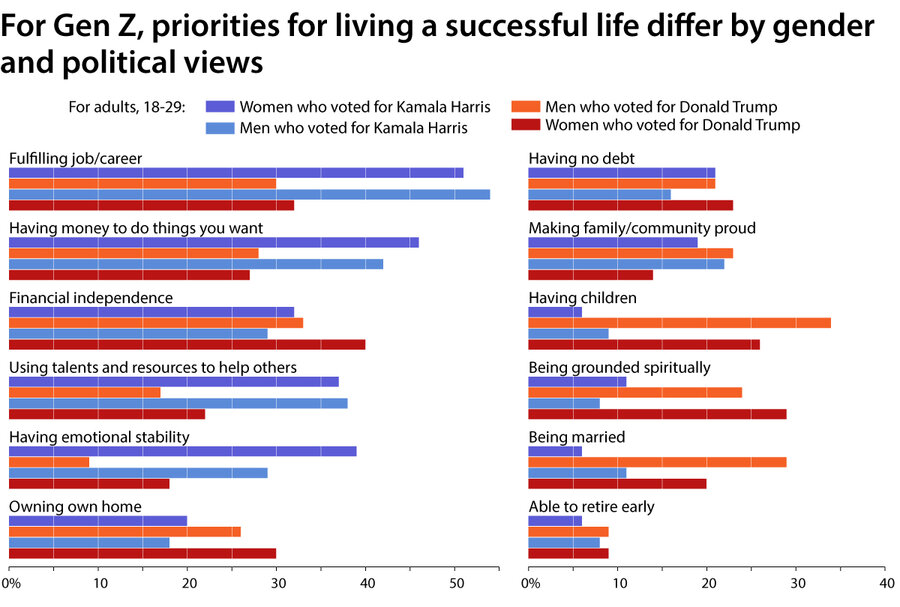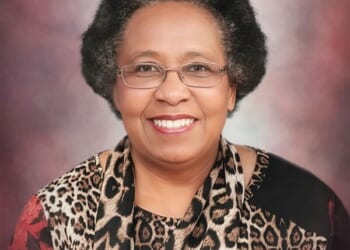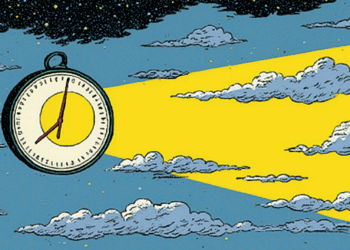There’s a “boy internet” and a “girl internet.” And the two exist separately. That’s what Marianna Pecora, a student majoring in political communication, jokes about with her friends. “I think it’s dangerous for our society in general to have such a wide gap between genders.”
The disconnect that Ms. Pecora and her friends have identified in social media feeds mirrors disconnects in surveys of Generation Z. In a recent NBC News poll, only 6% of young women who voted for then-Vice President Kamala Harris say they prioritize having children. That compares with 34% percent of young men who voted for President Donald Trump who say children are a top priority.
The polling highlights an aspect of today’s culture wars: the growing ideological rift between conservative young men and liberal young women, divided by views of politics and religion. These young women are also moving away from organized religion in greater numbers than prior generations. Often, that is a rejection of gendered roles that some churches, particularly evangelical ones, impose on them, says Katie Gaddini, a sociologist who studies women in religious spaces. Many who leave church chafe at religious leaders who describe the role of a woman as being a mother at home, not also as being a working professional.
Why We Wrote This
Polls show young liberal women prioritize financial independence, while young conservative men prioritize children. Those differing goals aren’t emerging in a vacuum. There has long been a segment of American Christians who question the legal rights of women. What’s changed is they now have a prominent voice in the Trump administration.
“The way that we treat women in society has real and tangible impacts,” says Ms. Pecora, a senior at George Washington University. “When you’re talking about women in such a belittling way, it’s going to close off at least a certain segment of them.”
Gen Z women say having children is a complicated choice – and one that relies on a financial stability that feels difficult to achieve for their generation.
The surveys showing differing priorities held by young women and men in opposite parties aren’t emerging in a vacuum. After Roe v. Wade was overturned in 2022, women on the left, and that is a majority of Gen Z women, have expressed concern that more of their rights could fall.
“On the political right and in the ‘manosphere,’ there is an attempt to hearken back to more traditional gender roles,” says Melissa Deckman, CEO of the Public Religion Research Institute.
The larger question is whether those ideas appeal to younger Americans, especially women, says Ms. Deckman. She doesn’t see convincing evidence that they broadly do.
When views on the fringes become more mainstream
There has long been a segment of American Christians who question the legal rights of women, from access to birth control to no-fault divorce to the 19th Amendment. What’s changed is that many people representing those views hold prominent positions in the Trump administration, bringing into the mainstream views that were once held on the fringes. Last month, Defense Secretary Pete Hegseth shared a video in which the leader of the church he attends said women shouldn’t have the right to vote independently of their husbands.
That pastor and theologian, Doug Wilson, has referred to women in crude and expletive-laden language, argued that sexism has virtues, and said that a woman’s biblical duty is to submit to her husband.
“Women are the kind of people that people come out of,” said Pastor Wilson in the CNN interview. “The wife and mother, who is the chief executive of the home, is entrusted with three or four or five eternal souls.”
That view of motherhood and helpmeet as the sole purpose of women, though not of the majority in Christian circles, has increasingly entered political conversations. In 2021, former Republican Rep. Madison Cawthorn referred to women as “earthen vessels” in a speech on the House floor.
Young women who spoke with the Monitor seem acutely aware of how recently women won rights such as holding a credit card in their own name, or when marital rape was recognized in court (both were in the 1970s). Today, young women outpace young men in higher education, making up 53% of the college-educated workforce.
“There’s this real bifurcation happening and these kinds of extreme reactions with Gen Z women, even though the majority of them are moving more to the left,” says Dr. Gaddini, whose research has focused on both young women who leave churches and women on the Christian right.
That creates a tension with political leaders who want to see an emphasis on the nuclear family. Birth rates in America have been declining for nearly two decades, falling to 1.6 this year. That’s well below the replacement rate of 2.1.
Some women also see divides with Gen Z men who say they prize having a family but don’t treat women as equals. Though tension around women’s rights is not new, the gender divide among Gen Z has intensified with the rise of influencers like self-proclaimed “misogynist” Andrew Tate. Mr. Tate has been charged with rape and human trafficking in Romania and the United Kingdom. He denies the charges.
“I think that the average man treats women very poorly and it’s so core to the way that young men are taught to behave,” says Emily, who declined to give her last name because she works in government. “Putting women down is such a tool for power in men’s playbook.”
After backing Joe Biden in 2020, Gen Z men turned out for Mr. Trump in 2024 – something the president credits a great portion of to Charlie Kirk, the conservative activist who was fatally shot. Mr. Kirk, alongside his wife, Erika Kirk, emphasized what the pair described as a traditional marriage based on biblical values.
So far, young men are not joining churches in droves. They’re simply staying put. Young women, meanwhile, are heading for the exits in greater numbers.
Politically, 58% of young women lean Democratic, while 52% of young men lean Republican. And of course, women are unlikely to decide whether to have children based on what politicians say. But many young women interviewed say that leaders’ statements about women don’t make them feel as though barriers to having children, like inadequate and expensive health care and child care, will improve.
In the first months of Mr. Trump’s second term, religious statements and values have been thrust into the spotlight in new ways, including discussion about family structures. Comments from prominent political figures in the Trump administration have echoed ideas formerly expressed mostly in the online “manosphere.”
Recently, Mr. Trump himself seemed to question whether domestic violence is a crime, while speaking at an event about religious liberty at the Museum of the Bible in Washington. “Things that take place in the home they call crime,” he said. “If a man has a little fight with the wife, they say, ‘This was a crime.’”
Debating cultural and Christian principles
The opposition to certain rights for women and to women in leadership roles in churches and other institutions is discouraging, says Robbie Cansler, lead pastor of The Mission Church of the Nazarene.
But opposition to women holding authority isn’t based on Christian principles, in her view. “They’re cultural principles that are being imposed,” she says.
The ideas often spread quickly online in a “real, scary phenomenon” known as rage bait, says Emily. “I think that at its core, a lot of Western society is built on the idea that women are subservient to men.”
In her own church, Pastor Cansler says the theological statement is pro-women. Only about 14% of lead pastors in the denomination are women, despite making up about half of all those ordained.
Pastor Cansler is examining that disconnect in her dissertation. “I think God is speaking to women,” she says. “But then the power holders, which tend to be white men and white middle-aged men … they feel that power shift. And I don’t think they like that.”
Beyond restrictive ideas about women’s roles in society, for many women, the question of whether to start a family comes down to one thing: expense.
“Really, what it comes down to is being wealthy enough to raise a kid,” says Emily.
Another “looming fear” is access to reproductive care, and concern that a woman’s health won’t be prioritized if something goes wrong in pregnancy.
And then, there are the cultural disconnects, says Ms. Pecora, the student. “I don’t want to have kids with any guy that’s talking about women like that.”













